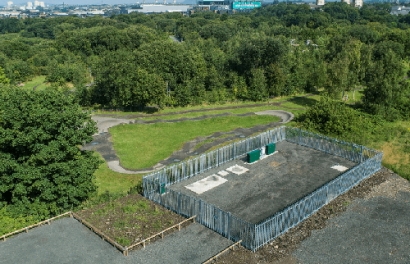
The Glasgow Observatory comprises 12 boreholes, which are 16-199m deep and fitted with 319 state-of-the-art sensors.
Data from the Glasgow Observatory will help scientists understand the subsurface better, and how heat using warm water from abandoned mines could be used as a renewable energy source for homes and industry.
A second observatory is planned for a site in Cheshire.
Central Scotland, northern England and south Wales all have flooded, abandoned mines that could be tapped to supply local communities or industry with heat.
One problem with the take up of geothermal has been the risk involved with uncertainty over the resource available, high initial costs and long-term investment.
The UK Geoenergy Observatories will address those risks by providing fundamental information about the subsurface.
Together, the observatories represent a £31 million investment by the UK government through the Department for Business, Energy and Industrial Strategy (BEIS).
They were commissioned by UK Research and Innovation’s (UKRI’s) Natural Environment Research Council (NERC) and delivered by the British Geological Survey (BGS), which will run the sites and manage their data.
Dr. Karen Hanghøj, executive director of the British Geological Survey, said, “The Glasgow Observatory builds on the city’s industrial past.
“The data from Glasgow’s abandoned mines will help us understand the processes and impacts of a mine water heat source and potential heat store as a sustainable way of heating homes and businesses in our cities.
“Over the next 15 years, the network of boreholes will monitor any changes in the properties of the environment below the surface, and help close the knowledge gap we have on mine water heat energy and heat storage.
“While today is the official opening, the Glasgow Observatory has been supplying scientists with open access data since drilling began in 2018.
“There is no other publicly-funded observatory like this in the world, and it is very fitting that it is located in Glasgow, which will host COP 26 next year.”
Professor Sir Duncan Wingham, Executive Chair of the Natural Environment Research Council, said, “The Glasgow Observatory is the first of our UK observatories that will create a high-resolution understanding of the underground system, providing a breakthrough in our knowledge of what lies beneath us.
“This £31 million investment is part of the UK’s national capability for world- class science, and will give the government, industry and regulators the knowledge required to understand how our underground might be used to power the future.
“As we approach the COP26 summit in Glasgow in November 2021, today’s event demonstrates how UK research is bringing our communities together to create solutions to climate change and enable the UK to reach net zero by 2050.”
The Glasgow Observatory has already released 19 open data packs, giving scientists access to borehole information including optical images from up to 199m underground, environmental monitoring data and live seismic monitoring.

